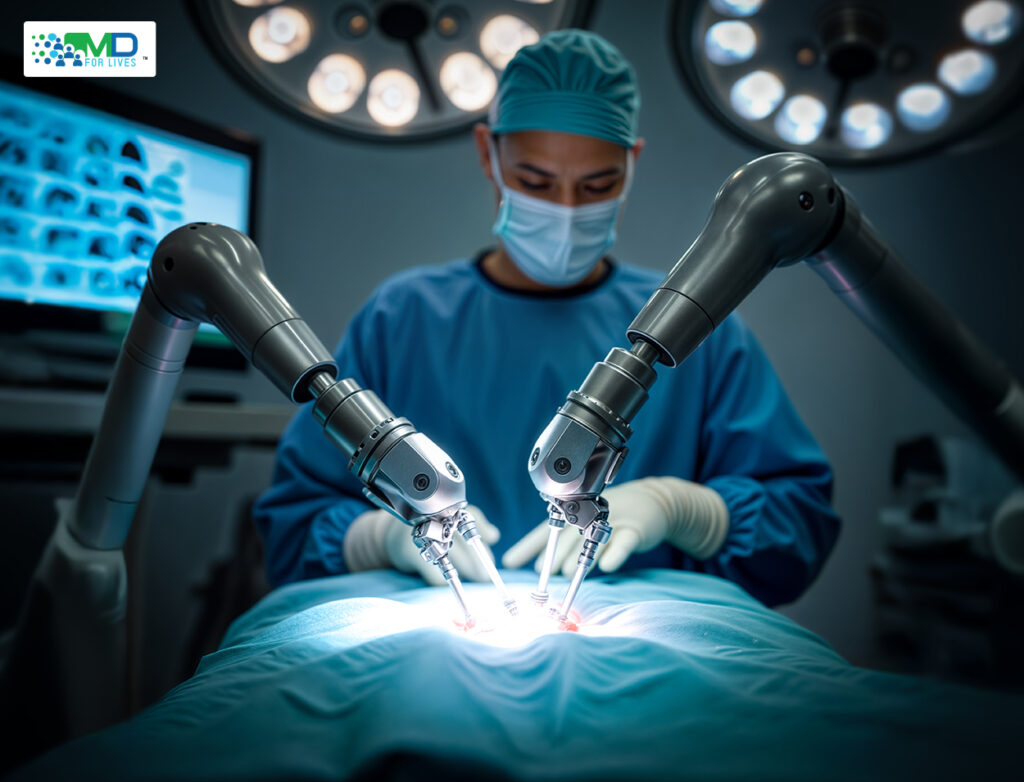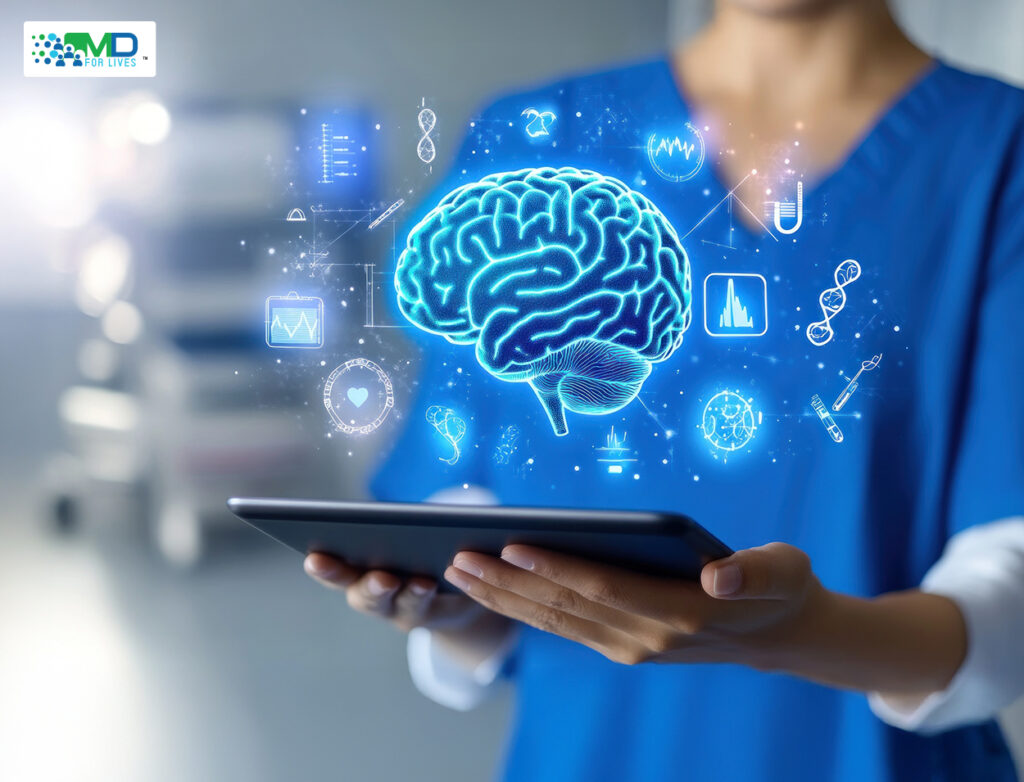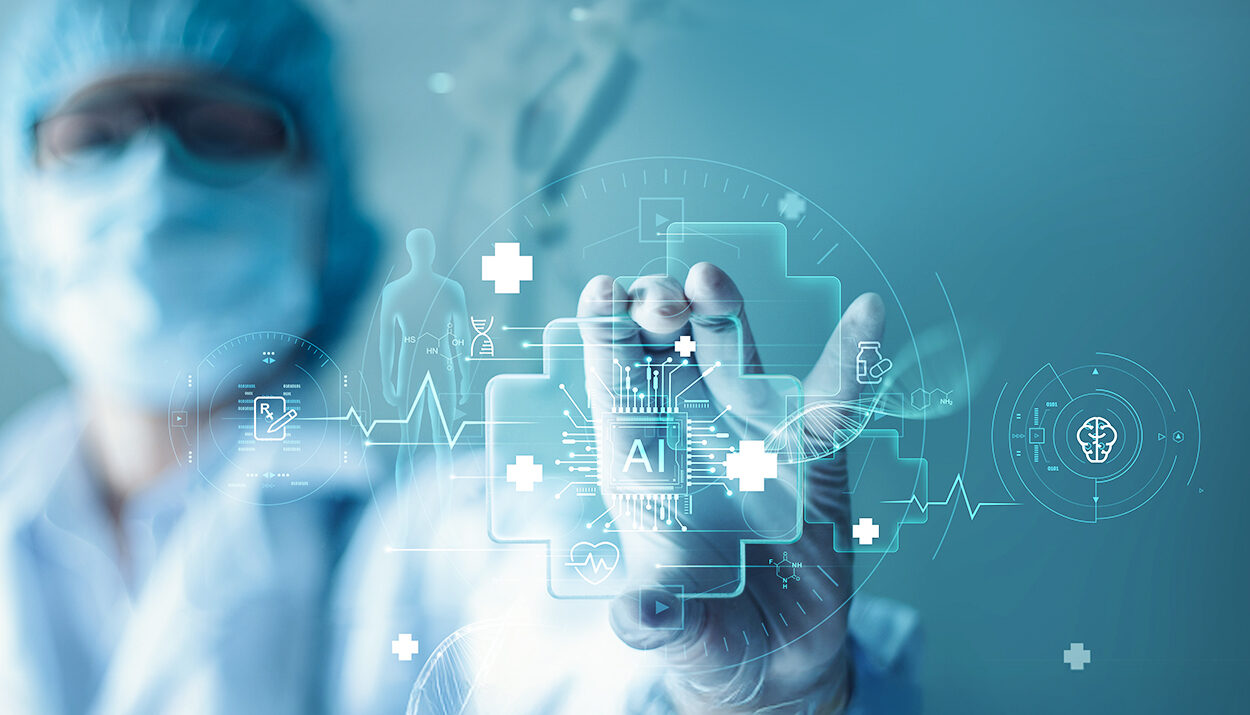In a rehabilitation center, Christine, a physiotherapist, helps a patient recover from knee surgery. With each movement, Christine adjusts her approach based on subtle cues, guiding the patient with care. Nearby, an AI system monitors the patient’s progress, offering suggestions for improvement. Well, the blending of human expertise and technology is becoming increasingly common and useful in healthcare settings!
While automation has proven to enhance patient care, the question remains: can AI replace the human touch?
A recent report reveals that 82.3% of allied health professionals feel unprepared for AI integration, but 73.6% express a desire for further training in digital health. As artificial intelligence continues to reshape healthcare, it’s vital for these professionals to evolve along with it. Well, it’s about remaining at the forefront of patient care without losing the human connection that truly makes a difference!
The Growing Role of AI in Healthcare
Not too long ago, a doctor sat in a quiet hospital room, scanning reports, looking for patterns, signs, anything that could speed up a diagnosis. Fast forward to today and sitting beside that doctor is a machine – one that can analyze thousands of scans in seconds, flagging abnormalities with astonishing accuracy! This isn’t just a concept anymore; it’s the future of automation in healthcare!
Well, this leap in technology is transforming healthcare faster than many expected. As AI continues to improve, how much more can one expect it to enhance patient care?
1. Diagnostic tools and automation
Gone are the days when doctors relied solely on their eyes to spot issues in X-rays and MRIs. AI can now analyze thousands of records and images in seconds!
A study showed that AI detects breast cancer in mammograms with 94.5% accuracy. Well, this advancement means quicker diagnoses and, potentially, better outcomes for patients.
AI is also optimizing administrative tasks, such as appointment scheduling and patient data management, which helps reduce delays in care. Isn’t that amazing for everyone in healthcare?
2. AI-powered patient monitoring systems
Ever wondered how hospitals manage round-the-clock care for so many patients? How do they ensure that no patient is overlooked? Well, automated healthcare monitoring systems are stepping in to help.
These artificial intelligence systems track vital signs around the clock, identifying potential issues long before they escalate. In elder care, for example, AI-driven fall detection systems analyze patterns in movement and send immediate alerts to caregivers. This reduces response times, preventing injuries that could otherwise be life-threatening.
3. Robotics in surgery and rehabilitation

Robotic surgery is no longer in the distant future – it’s here, and it’s saving lives! These systems offer incredible precision, reducing complications like excessive bleeding and speeding up recovery times. Well, the impact doesn’t stop there!
After surgery, AI-powered rehabilitation devices adjust therapy based on real-time patient data, ensuring recovery is personalized and effective. These advancements are helping patients recover more quickly and with fewer complications.
Robotic process automation in healthcare offers precision, but the AI versus human brain in critical decision-making during surgery is where professionals continue to lead. Technology can assist, but it is the healthcare professional’s care, judgment, and emotional support that truly guide patients through the recovery process.
What AI Will Never Replace: The Human Touch
Now that it’s clearer how automated healthcare is the future, it’s important to acknowledge its limits, too. Healthcare is not just about data and diagnostics – it’s also about instinct, empathy, and human connection. These are qualities that make care deeply personal. So, what is AI unable to replicate?
1. Empathy, communication, and intuition

When interacting with patients, it’s not just the treatment plan that matters but the ability to listen, understand, and provide support. While AI can analyze data and predict outcomes, it cannot match the artificial intelligence vs. human intelligence dynamic! It cannot provide the reassurance that comes from a clinician’s presence. A patient may be more likely to trust and adhere to treatment when they feel understood and cared for, something that AI lacks the capacity to offer.
2. The value of hands-on care and human judgment
In clinical settings, it’s the human touch that makes all the difference in delivering personalized care. Take physiotherapists, for example: They use their experience to read the subtle signs of discomfort, adapting on the spot based on how the patient feels.
Well, no matter how advanced artificial intelligence gets, it can’t replace that hands-on understanding. This human judgment is what tailors care to the patient’s unique needs.
3. Adaptability and creative problem-solving:
Healthcare is never predictable, is it? From language barriers to cultural sensitivities, the situations healthcare professionals face requires quick thinking and real-time solutions. Even in emergencies, it’s the ability to adapt and think on the feet that makes the difference!
AI can crunch numbers and predict trends, but it doesn’t have the creativity to navigate these unpredictable challenges. Allied health professionals shine in these moments, blending their clinical expertise with critical human insight.
While AI certainly boosts diagnostic precision and efficiency, it’s clear that the human touch -with all its empathy, judgment, and adaptability, will always be irreplaceable. The future of healthcare isn’t about AI vs. humans. It’s about using technology to empower human expertise, not replace it.
Can Humans and AI Be Healthcare Allies?
In healthcare, the collaboration between human expertise and AI technology is changing patient care. Artificial Intelligence excels at processing vast amounts of data, identifying patterns, and making predictions. But can it replace the intuition and empathy that only humans can offer?
While artificial intelligence enhances diagnostics and efficiency, it is the human touch through ethical judgment and understanding that ensures personalized care. Together, humans and machines can provide better outcomes.
So, isn’t it clear that this synergy, rather than competition, is the future of healthcare? The future of AI vs. human is more collaboration in healthcare!
What are the Limitations of AI in Healthcare
Despite its advancements, AI for allied health professionals has limitations, particularly in areas requiring emotional intelligence and hands-on care.
- Lack of transparency: Well, AI models often act as “black boxes,” where even experts can struggle to understand how decisions are made. How can a system be trusted if it isn’t clear how it works, especially when it comes to patient care?
- Data dependency: AI systems rely heavily on the data they are trained on. If that data is incomplete or biased, the outcomes can be skewed. Moreover, when AI models aren’t trained on diverse data, they might fail to recognize conditions in certain populations, leading to inequalities in patient care.
- Misinterpreting complex cases: AI might excel at analyzing numbers and patterns, but it lacks the ability to interpret the complexities of human health. Take a rare disease or an ambiguous symptom – AI could miss these details that a human clinician would catch.
- Bias and inequality: Even advanced AI can reflect existing biases present in its training data. For instance, when training data lacks representation from diverse ethnic groups, AI systems may underperform with certain populations, leading to poorer outcomes.
While artificial intelligence is certainly an asset in healthcare, it cannot replace the critical thinking, empathy, and nuanced judgment that healthcare professionals bring to the table. It’s clear that technology should be a tool to support, not replace, human expertise.
It’s Not AI vs. Human, but How They Can Work Together!

As healthcare professionals, you’ve likely witnessed firsthand how technology is transforming patient care. With machines handling repetitive tasks like diagnostics and data analysis, it’s natural to wonder – “How much of this can we rely on?” “Will technology eventually replace the roles that we’ve dedicated our careers to?”
Well, the future of automation in healthcare holds tremendous potential, but it’s clear that human involvement will always be essential for patient-centered care.
As the AI vs. human debate continues to grow, your expertise remains central to patient care. Technology should be seen as a tool to empower you, allowing for better, more personalized care, rather than replacing the human elements of healthcare.
Want to play an active role in shaping the future of healthcare? By participating in surveys on MDForLives, you can contribute your insights and make a direct impact on how healthcare evolves. Your expertise is vital in ensuring that both technology and human care work together to provide the best outcomes for patients.
FAQs
-
Can AI replace allied health professionals in healthcare?
No, the question is not AI vs. human! AI can assist but cannot replace allied health professionals. Human skills like empathy, intuition, and judgment are essential in healthcare, areas where artificial intelligence still struggles to match human expertise.
-
What is the role of AI in allied health fields?
AI supports allied health professionals by enhancing diagnostics, automating administrative tasks, monitoring patients, and aiding in surgical procedures, improving efficiency and accuracy in patient care.
-
How can allied health professionals benefit from AI?
Artificial intelligence helps streamline workflows, reduces human error, and provides valuable insights through data analysis. It allows allied health professionals to focus more on patient care by automating routine tasks.
-
Are there limitations to AI in providing patient care?
Yes, AI lacks empathy, creative problem-solving, and hands-on care. Its reliance on data and algorithms also faces limitations in addressing complex, emotional, or nuanced aspects of patient care.
-
Will AI make allied health jobs obsolete in the future?
While artificial intelligence will transform roles, it won’t replace allied health jobs. Instead, it will enhance these roles, creating opportunities for professionals to focus more on patient interaction and less on administrative tasks.

MDForLives is a global healthcare intelligence platform where real-world perspectives are transformed into validated insights. We bring together diverse healthcare experiences to discover, share, and shape the future of healthcare through data-backed understanding.






